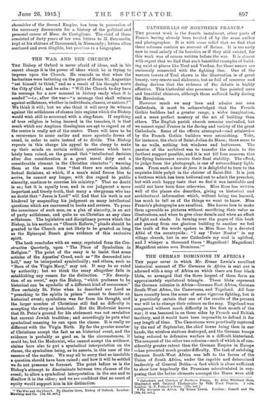THE WAIL AND THE CHURCH"
THE Bishop of Oxford is never afraid of ideas, and in his recent charge it is the power of ideas which he is trying to impress upon the Church. He reminds us that when the barbarians were battering on the gates of Rome St. Augustine "set himself to think," and as a result of his thought wrote the City of God; and be asks: "Will the Church to-day have its message for a new moment in history ready when it is needed "—i.e., after the war—" a message that shall witness against selfishness, whether in individuals, classes, or nations ?" We think it will; but we also think it will carry its witness against the selfishness of classes into regions which the Bishop would wish still to surround with a ring-fence. If anything of true religion is being learned in the trenches, it is that much which our Anglican theologians are apt to regard as of the centre is really not of the centre. There will have to be a recurrence to some earlier and more apostolic forms of creed, in order to unite instead of to divide. The Bishop repeats in this charge his appeal to the clergy to make up their minds on certain critical questions which have lately been raised, on the ground that "intellectual decision after due consideration is a great moral duty and a considerable element in the Christian character "; warning them at the same time "that there are certain intel- lectual decisions, at which, if a man's mind forces hire to arrive, he cannot any longer, with due regard to public sincerity, continue to exercise his ministry." That no doubt is so; but it is equally true, and in our judgment a more important and timely truth, that many a clergyman who has no doubt that " Jesus is Lord" will find that his work is not hindered by suspending his judgment on many intellectual questions which are canvassed in books and reviews. To press the conscience of such men, on a plea of sincerity, is an act of party selfishness, and quite as un-Christian as any clue selfishness. The legislative and disciplinary powers which the Bishop, in his section on "Church Reform," pleads should be granted to the Church are not likely to be granted as long as the Episcopal Bench gives evidence of this exclusive spirit.
The book concludes with an essay, reprinted from the Con- structive Quarterly, upon "The Place of Symbolism in Religion." The point of the essay is to insist that some articles of the Apostles' Creed, such as "He descended into hell," may be interpreted symbolically; and others, such as "Born of the Virgin Mary," may not. It may be so ruled by authority; but we think the essay altogether fails in establishing any reason for the distinction. "No descrip- tion of an event," says the Bishop, "which professes to be historical can be symbolic of a different kind of occurrence." Now certainly St. Peter when be described our Lord as "preaching to the spirits in prison" meant to describe an historical event; symbolism was far from his thought, and the larger number of Christians still find no difficulty in accepting the story as historical. But the Modernist knows that St. Peter's ground for his statement was net revelation but current Jewish tradition ; and accordingly he puts what symbolical meaning he can upon the clause. It is really no different with the Virgin Birth. By far the greater number of Christians accept the fact as an historical event, and the evidence is probably as good as, in the circumstances, it could he; but the Modernist, who cannot accept the evidence, claims here also to put a symbolical interpretation on the clause, the symbolism being, as he asserts, in this case of the essence of the matter. We may all be sorry that so insoluble a question should have been raised; and bow it will be settled we do not presume to forecast The point before us is the Bishop's attempt to discriminate between two clauses of the creed; to allow a symbolical interpretation in the one and to disallow it in the other; and we are confident that DO court of equity would support him in his distinction.
• The War and ts. Church. By Charles Gore, Bishop of Oxford. London: Wowbray and Co. (Is. 6d. net.]














































 Previous page
Previous page